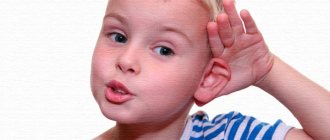Article:
Parents often come to a speech therapist with the question: “Why doesn’t my child pronounce letters and what to do about it?”
I would like to immediately clarify that it is not letters that the child pronounces or does not pronounce, but sounds. Many adults make the mistake of confusing these concepts.
Even in utero, the baby is faced with the sounds that surround his mother. After birth, with each month, the perception of sounds becomes clearer and gradually the baby learns to speak on its own. And only when a child learns to read and write does he become familiar with letters. Letters are special characters that are used to represent sounds in writing. Thus, we hear and pronounce sounds, and we write and read letters.
But let’s return to the parents’ question: “Why doesn’t my child pronounce some letters?” Let's figure out what exactly is a specific feature of speech development of a particular age. After all, in order to see whether a child has problems with speech, it is necessary to compare the development of normal speech with how your child’s speech activity is progressing at the moment.
Age norms for children's speech development
So, the norms for speech development are as follows:
| Stage of speech development | Child's age | Characteristic |
| Scream | From birth | With the help of a cry, a child communicates with the people around him. Attentive mothers very quickly begin to distinguish between a cry of pain, a cry of hunger, a cry of pleasure, etc. By the end of the first month, the baby is already able not only to scream, but also to focus on the conversations of adults and listens to them. |
| Revitalization complex | 3 months | When the mother appears, the baby begins to smile, wave his arms, wiggle his legs and make sounds. If the “revival complex” does not appear until the tenth week, this is an alarming sign that may indicate a delay in mental development. In this case, you should immediately consult a doctor. |
| Booming | 4 months | The baby reproduces various sounds (the rear lingual consonants “g”, “k”, “x” and familiar vowels are used) and their combinations in any order: “gy”, “kh”, “agu”, etc. Gradually it becomes “singing”, new sounds appear, for example “b”, “p”. |
| Babbling | 6 months | Repeated repetition of syllables: “ta-ta-ta,” “dya-dya-dya,” “ma-ma-ma.” At six to nine months, the baby begins to accumulate a passive vocabulary. If you ask: “Where is mom? Where is the ball (or bunny)? then the child begins to look for these objects with his eyes and turn his head in their direction. Also at this age the baby reacts to his name. Good at distinguishing his own people from strangers. The child actively uses gestures in communication, for example, nodding or shaking his head, waving his hand goodbye. |
| Babbling words | 9-12 months | As babbling continues, a transition to words occurs. So-called babbling words appear (mother, woman, am, give). And even if your baby constantly calls the teddy bear “mi-mi,” consider it a word. |
| “Adult words” | 1.7-1.9 months | Usually, children hear adults speak and repeat the words after them as best they can, while simplifying them (pais-sleep, pissy-let's go, moko-milk). This is acceptable for this age. |
| Offers | 2 years | By the age of two, a child learns to use two-word phrases (lala bah, mama am). From the age of two, proposals appear and develop. 2/3 of what a child says is understandable to others. The concepts of “I” and “mine” begin to appear. |
| Grammatically correct speech | 3-4 years | By the age of three, complex sentences appear, almost all parts of speech, conjunctions, prepositions, singular and plural are used. They know their gender, name, age, parents' names. By the age of four, a child’s speech is grammatically correct, suffixes are used in words, and phrases become more complex. |
Experts evaluate the subsequent development of speech based on the ability to answer given questions, the ability to build sequential chains and compose stories from pictures, talk about an event, retell a story or fairy tale, and the presence of initiative in a conversation.
These standards, like any others, are an average indicator on which specialists (speech therapists, speech pathologists, neurologists) rely when making a diagnosis. You need to strive for them and you need to focus on them. But this does not mean at all that all indicators should be exactly like this. Your baby is individual. It develops at its own pace. The main task of parents is to help their baby move in the right direction, and if necessary, provide him with the necessary help in a timely manner.
A child’s speech is like clay: raw clay is easy to give the desired, correct shape. But is it possible to mold something from already dried clay? The result will certainly be disastrous!
Dear mothers and fathers, remember: it is much more difficult to correct “old” speech defects!!!
Reasons for incorrect pronunciation
Let us separately dwell on those factors that can cause a child to incorrectly pronounce certain sounds. There are several main reasons:
- Disorders of the articulatory apparatus. In this case, speech can be corrected with the help of speech therapy exercises aimed at eliminating specific defects. This will require perseverance, patience and effort from both the child and the parents.
- Diseases of the respiratory system or articulatory apparatus. If any are identified, you must seek help from a doctor who will cure the existing diseases. Only after this can you begin work on setting the sound R.
- Incorrect behavior of people around the child. Very often, adults deliberately distort their speech, believing that this is how they speak a language more understandable to children. And a child, hearing incorrect speech from infancy, gets used to such pronunciation, considering it correct. The result is defective speech.
These are the most common reasons why a child speaks incorrectly. In reality there may be much more. Only a speech therapist can identify them.
Why doesn't the child pronounce some sounds? Why do speech disorders occur?
Of course, the true cause must be determined by a doctor. Most likely, it will be necessary to consult not only a speech therapist, but also other specialists, such as a neurologist, psychiatrist, or otolaryngologist. But you yourself are able to guess what could affect the delay in speech.
Possible reasons:
- Negative factors during pregnancy and childbirth.
- Frequent illnesses, infections and injuries for up to three years. This is the period when speech is intensively formed.
- Decreased physiological hearing.
- Underdevelopment of phonemic hearing (the ability to isolate, reproduce, distinguish speech sounds).
- Imitation of incorrect speech. Often adults adapt to the child’s speech and “babble” with children for a long time. Such speech does not stimulate correct sound pronunciation and perpetuates its shortcomings. The same thing happens when a child constantly communicates with younger children. It happens that someone in the family does not pronounce certain sounds and the child copies this incorrect sound pronunciation. If a child often communicates with people with unclear, hasty speech, this causes particular harm.
- Bilingualism in the family.
- Pedagogical neglect. Usually, with pedagogical neglect, the normal development of speech is inhibited due to the fact that parents do not pay attention to their child’s speech, do not notice violations, do not correct mistakes, do not give correct pronunciation samples, and do not develop speech.
- Disadvantages of the speech apparatus: malocclusion, short frenulum of the tongue, narrow, very high or flat palate.
Sound pronunciation disorders manifest themselves in speech in different ways:
- This or that sound is missing: rocket (aketa), moon (una).
- Sound distortion: for example, instead of the standard r, a velar or uvelar sound (burr) is pronounced, or instead of the standard s, z, w, zh, c, interdental sounds are pronounced when the tip of the tongue falls out between the teeth
- Replacing one sound with another, available in the phonetic system of the Russian language: shishka-syska, mouth-lot, etc.
There are many diagnoses for speech disorders, such as dyslalia, dysarthria, stuttering, rhinolalia, alalia, mutism, autism, and general speech underdevelopment.
Of course, you don’t need to try to put them on your child yourself. For this purpose, it is better to visit a specialist.
All these violations are quite serious, which most often cannot be corrected in the year before school. If they are not eliminated by the age of 6, then they will most likely turn into persistent and complex ones and will come back to haunt the school with reading and writing disorders.
Therefore, do not close your eyes to any deviations in the speech of your children! Almost every violation can be corrected, the main thing is not to waste time. I would like to note that it is important to correct speech impairments in a comprehensive manner, with the participation of a speech therapist, neurologist, pediatrician, psychiatrist, speech pathologist, and psychologist. You may need the services of an audiologist, endocrinologist, or ophthalmologist.
But correction and restoration of a child’s speech depends not only on doctors and modern techniques. Parents and the child’s family play an important role. Relatives need to team up with specialists, listen and complete all assignments, homework, make every effort to achieve the intended goal and this will definitely have a positive effect!
To develop a child’s speech and form correct sound pronunciation, it is necessary to use every minute of communication!
How to determine that a child needs help from a speech therapist
You need to seriously worry about the correctness of your child’s speech if the child has not learned to pronounce the sound R by the age of six. In this case, the right decision would be to contact a professional speech therapist, who, first of all, will determine the cause of the speech defect. This is very important so that the assistance of a specialist is more effective and efficient. After all, the cause of defective pronunciation of the sound P can be not only the underdevelopment of the child’s speech apparatus, but also the development of serious respiratory diseases.
In addition, a speech therapist will help you choose a set of individual exercises for your child, aimed at eliminating his specific deficiencies. Such articulatory gymnastics is a prerequisite for establishing the correct pronunciation of complex sounds.
What in a child’s speech should alert parents and decide to consult a specialist? These are obvious pronunciation defects such as:
- When pronouncing, the child replaces the sound R with the sound L;
- The child does not pronounce the sound R in words, skipping it;
- The child pronounces the sound R not growling, but guttural;
- The child pronounces the endings of words indistinctly and unclearly.
If such manifestations are observed in a four- to five-year-old child, then there is no need to worry yet. However, certain exercises that will help the child quickly subjugate his speech apparatus will not be superfluous.
How to form correct sound pronunciation in a child: recommendations for parents
- Let your speech always be clear and correct, without “lisping” or distortion of words.
- Enrich your child's vocabulary. Conversations, stories, reading contribute to this in the best possible way! They can be used for a walk, in transport, or at play. Whatever you do, communicate with your baby, explain, explain what is happening around you, why and why it is necessary. For example, when playing with cereals and containers, you can say: “Look, Mashenka, what grains. We use them to cook porridge for Mashenka. This is buckwheat. Do you like buckwheat porridge? Yes, our Mashenka loves buckwheat porridge. But this is rice. The grains are white and long. Come on, let's take them in our palm. Oh, what grains! Let's pour them into a container. That's how they hit the bottom!
- Set an example by reading books and newspapers yourself.
- Games to develop correct sound pronunciation, develop clear diction, develop auditory attention and phonemic perception should occupy a huge place in children’s lives. For example, by playing with a ball, which every child has, you can develop phonemic processes and form correct sound pronunciation. Adult: “I will name the sounds, and you throw the ball up when you hear the sound “A.” Once you catch it, repeat this sound.” Or you can throw a ball and say words that the child must repeat when returning the ball (bag, dishes, traffic lights, etc.). Then the adult can confuse the words by rearranging sounds and syllables, and the child must unravel them (podusa-dishes, sveforto-traffic light, kasum-bag). You can objectively evaluate your child’s sound pronunciation in a playful way. To improve diction, while looking at pictures in books or playing with toys, you can recite simple sayings with your child, for example: “Moo-moo-moo, who wants milk?”, “Buba the hare has a toothache,” etc.
- Finger games, fingering cereals and small objects, drawing with pencils, crayons and finger paints, and modeling are great for speech development. You can read more about the relationship between fine motor skills and speech.
- Visit interesting places together more often: museum, circus, forest, park, theater. Let the kids' lives be full of impressions. This gives a powerful impetus to the development of speech.
And most importantly, love your children, and not your ideal idea of them, and remember that each of them is human! Respect children! Good luck!
Handwriting correction.
The fact is that for a child with dysgraphia, handwriting causes a certain difficulty. Typically, such children write either very small or extremely large. Sloppy handwriting is not a negative thing, and you shouldn’t scold a child for it.
It will take about three weeks to teach a student to write correctly. First, you need to purchase a squared notebook and ask to reproduce the text on paper. The letter should not go beyond the cell - the main rule. You need to monitor this and support the child in every possible way.
You cannot overload children; a few correctly written lines a day are an excellent result. Even if parents are tired of working with their child, it is strictly forbidden to show it, much less raise their tone. It is recommended to use pens with a ribbed surface as writing instruments, as well as pencils in the shape of a triangle.
At home, you can play with your child by giving him a pen and ink. Then he will try to write correctly so as not to spoil the game.
Checking the child’s speech: defects in the structure of the speech organs
Short frenulum of the tongue
To identify a short frenulum of the tongue, ask the child to raise the tongue towards the upper teeth.
With a very short frenulum, the baby will not be able to lift his tongue at all. If the frenulum is not shortened too much, the tongue will rise, but its tip will appear forked (heart-shaped), because the frenulum will pull it down. If the child cannot lift his tongue at all, you need to do this with the smooth handle of a teaspoon.
A short or shortened frenulum of the tongue causes defects in the pronunciation of the sounds “zh”, “sh”, “r”, “l”.
Paresis of the muscles of the lips and tongue
Paresis is a weakening of muscle movements. The movements of the speech organs are sluggish, imprecise, and sometimes uncoordinated. To identify this disorder, ask your child to perform several exercises:
- stretch your lips forward. If the child finds it difficult, this may be a sign of paresis.
- stretch your lips into a smile. With paresis, the smile will be a little “crooked” - one side of the lips moves less.
- make the tongue wide, like a “scapula”. With paresis, the child cannot do this; the tongue constantly narrows.
- stick your tongue out of your mouth. With paresis, the tongue tilts to one side or trembles.
- open your mouth and hold it in this position. The tongue with paresis may have the appearance of a “lump”.
- touch the tip of your tongue to the corners of your mouth. With paresis, the tip of the tongue does not narrow and does not fit clearly into the corner of the mouth.
If you notice at least some of these signs in your baby, you will need the help of a neurologist, and not just work with a speech therapist.
Malocclusion of teeth
If the baby’s upper or lower jaw moves forward, then it is necessary to visit an orthodontist.
Pathologies of tempo and rhythm of speech
Sometimes the baby “swallows” parts of the word due to the accelerated rate of speech. If the pronunciation is too slow, he, on the contrary, stretches words into syllables, sometimes missing some of them. Pauses between syllables or words may increase. Speech therapy exercises and rhythmic exercises will help to cope with the defect.
The acceleration of the pace is due to overexcitement and increased anxiety. Therefore, therapy is aimed at reducing excitability - physiotherapy, homeopathic sedatives.
Children are prone to imitation. Therefore, if there are relatives in the family with a similar defect, he should also fight the violation. Otherwise, constant relapses will occur.
This group of speech disorders also includes stuttering, when a child cannot say a whole word, constantly repeating individual syllables. There are two forms – reactive and developmental stuttering. The latter occurs when parents teach difficult to pronounce words to a child whose articulatory apparatus has not yet formed. The reactive form is a reaction to stress - fear, long-term illness, conflicts between parents. This disorder is accompanied by neurotic symptoms - decreased or lack of appetite, sleep disturbances, nightmares, enuresis.








